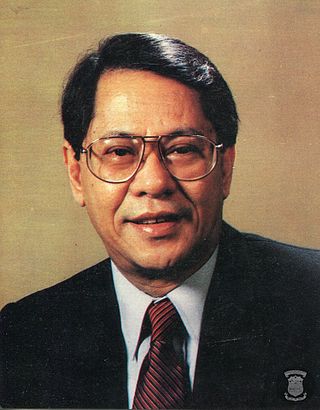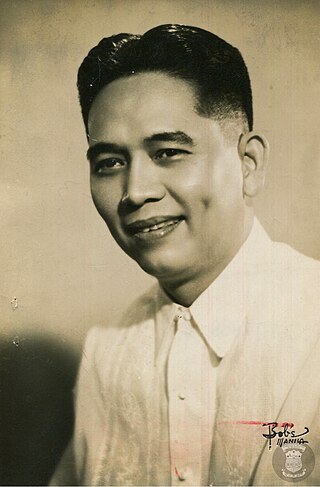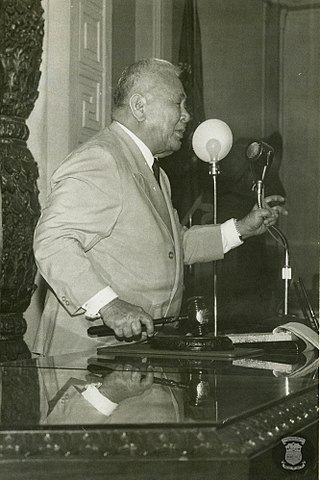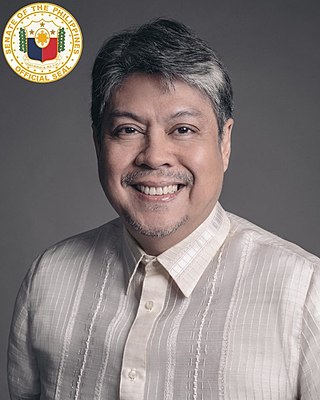
The 2004 election of members to the Senate of the Philippines was the 28th election to the Senate of the Philippines. It was held on Monday, May 10, 2004, to elect 12 of the 24 seats in the Senate. The major coalitions that participated are the Koalisyon ng Katapatan at Karanasan sa Kinabukasan, composed of parties that support the candidacy of President Gloria Macapagal Arroyo, and the Koalisyon ng Nagkakaisang Pilipino, composed of parties that support the candidacy of film actor Fernando Poe Jr. coalition. The Alyansa ng Pag-asa was a minor coalition made up of Aksyon Demokratiko and Partido para sa Demokratikong Reporma–Lapiang Manggagawa. K4 won seven seats, while the KNP won the remaining five contested seats.

Jovito Reyes Salonga, KGCR also called "Ka Jovy," was a Filipino politician and lawyer, as well as a leading opposition leader during the regime of Ferdinand Marcos from the declaration of martial law in 1972 until the People Power Revolution in 1986, which removed Marcos from power. Salonga was the 14th president of the Senate of the Philippines, serving from 1987 to 1992.

The 1998 election of members to the Senate of the Philippines was the 26th election to the Senate of the Philippines. It was held on Monday, May 11, 1998 to elect 12 of the 24 seats in the Senate. The two main competing coalitions in the senatorial election were Lakas—National Union of Christian Democrats—United Muslim Democrats of the Philippines and the Laban ng Makabayang Masang Pilipino umbrella coalition composed of Laban ng Demokratikong Pilipino, Pwersa ng Masang Pilipino, Nationalist People's Coalition, and Partido Demokratiko Pilipino—Lakas ng Bayan. The two coalitions split the 12 contested seats 7–5 in favor of LAMMP.

The 1995 election of members to the Senate of the Philippines was the 25th election to the Senate of the Philippines. It was held on Monday, May 8, 1995, to elect 12 of the 24 seats in the Senate. Filipinos protected the ballot boxes with their lives and campaigned against traditional politicians who used bribery, flying voters, violence, election rigging, stealing of ballot boxes, etc. The Philippine National Police (PNP) listed five people dead and listed more than 200 hotspots before and 300 hotspots during the election.

The 1992 election of members to the Senate of the Philippines was the 24th election to the Senate of the Philippines. It was held on Monday, May 11, 1992. This was the first general election under the 1987 Philippine Constitution. An estimated 80,000 candidates ran for 17,000 posts, from the presidency all the way down to municipal councilors.

A senatorial election was held on November 11, 1969 in the Philippines. While incumbent President Ferdinand Marcos won an unprecedented second full term as President of the Philippines, and his running mate, incumbent Vice President Fernando Lopez was also elected to a third full term as Vice President of the Philippines, their Nacionalista Party-mates also won six of the eight contested seats in the Philippine Senate increasing their majority in the Senate.

A senatorial election was held on November 9, 1965 in the Philippines. The Nacionalista Party wrestled back control of the Senate; originally a Liberal, Senate President Ferdinand Marcos defected to the Nacionalistas, became their presidential candidate and won this year's election.

A senatorial election was held on November 14, 1961 in the Philippines. The two candidates of the Progressive Party, guest candidates of the Liberal Party, topped the election, while the Liberals themselves won four seats cutting the Nacionalista Party's majority to 13 seats in the 24-seat Philippine Senate.

A senatorial election was held on November 12, 1957 in the Philippines. The Nacionalista Party, despite losing two seats to the Liberal Party still held the Senate with twenty seats. The Liberals who won were actor Rogelio de la Rosa and former basketball player Ambrosio Padilla.

Elections for the members of the Senate were held on November 10, 1953 in the Philippines. Incumbent President Elpidio Quirino of the Liberal Party lost his opportunity to get a second full term as President of the Philippines to former Defense Secretary Ramon Magsaysay of the Nacionalista Party. Quirino's running mate, Senator Jose Yulo lost to Senator Carlos P. Garcia. Vice President Fernando Lopez did not run for re-election and ran for the Senate instead, in which he emerged as the candidate with the most votes. This was the first time that an elected president did not come from the Senate. To further compound the Liberal Party's woes, they also failed to win any seats in the Senate in this election.

Elections for the members of the Senate were held on April 23, 1946, in the Philippines.

Eva Estrada Kalaw was a Filipina politician who served as a senator in the Senate of the Philippines from 1965 to 1972 during the presidency of Ferdinand Marcos. She was one of the key opposition figures against Marcos' 20-year authoritarian rule and was instrumental in his downfall during the People Power Revolution in 1986. As a senator, she wrote several laws relating to education in the Philippines, such as the salary standardization for public school personnel, the Magna Carta for Private Schools, the Magna Carta for Students, and an act to institute a charter for Barrio High Schools. She was also among the Liberal Party candidates injured during the Plaza Miranda bombing on August 21, 1971.

The 1987 election of members to the Senate of the Philippines was the 23rd election to the Senate of the Philippines. It was held on Monday, May 11, 1987. The Philippine Senate was re-instituted following the approval of a new constitution in 1987 restoring the bicameral Congress of the Philippines; earlier, a constitution was approved in 1973 that created a unicameral Batasang Pambansa (parliament) that replaced the bicameral Congress. The last Senate election prior to this was the 1971 election.

A senatorial election was held on November 14, 1967, in the Philippines. The 1967 election for the members of the Philippine Senate were also known as the 1967 midterm election, as the date where the elected candidates take office falls halfway through President Ferdinand Marcos' four-year term. The administration Nacionalista Party won seven seats in the Philippine Senate while the Liberal Party won one seat; the Nacionalistas got the majority in the Senate after having twelve of the 24 seats in the Senate prior to the election.

A senatorial election was held on November 10, 1959 in the Philippines. The 1959 elections were known as the 1959 Philippine midterm elections as the date when the elected officials take office falls halfway through President Carlos P. Garcia's four-year term.

A senatorial election in the Philippines was held on November 8, 1955. This was a midterm election, the date when the winners took office falling halfway through President Ramon Magsaysay's four-year term.

Elections for the Senate of the Philippines were held on November 11, 1947, with eight of the 24 seats in the Senate being contested. These eight seats were elected regularly; the winners were eligible to serve six-year terms from December 30, 1947, until December 30, 1953. Gubernatorial and local elections were held on the same date.

The Plaza Miranda bombing occurred during a political rally of the Liberal Party at Plaza Miranda, Quiapo district, Manila, the Philippines on August 21, 1971. It caused nine deaths and injured 95 others, including many prominent Liberal Party politicians.

The 2010 election of members to the Senate of the Philippines was the 30th election to the Senate of the Philippines. It was held on Monday, May 10, 2010, to elect 12 of the 24 seats in the Senate. The winners in this election joined the winners of the 2007 election to form the 15th Congress of the Philippines. The senators elected in 2007 will serve until June 30, 2013, while the senators elected in this election will serve up to June 30, 2016. The 2010 presidential election, elections to the House of Representatives as well as local elections occurred on the same date. The Philippines uses plurality-at-large voting for seats in the Senate: the twelve candidates with the highest number of votes wins the twelve seats up for election.

Presidential and vice presidential elections, legislative elections and local elections were held in the Philippines on May 11, 1992. An estimated 80,000 candidates ran for 17,000 posts from the presidency down to municipal councillors in the first general election under the 1987 Constitution. Even though she was permitted by the Constitution to run for a second term, President Corazon Aquino did not stand for re-election.















